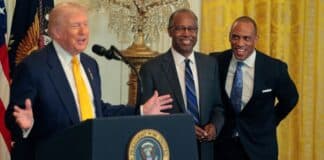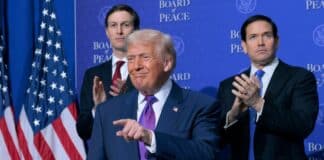Canada’s Security and Intelligence Threats to Elections (SITE) task force announced Friday that it has identified “coordinated and malicious activity” from accounts linked to the People’s Republic of China (PRC), targeting former finance minister Chrystia Freeland. Freeland, a leading Liberal Party candidate to replace outgoing Prime Minister Justin Trudeau, has responded defiantly to the interference.
Global Affairs Canada stated that SITE traced an “information operation targeting Chrystia Freeland” to an anonymous blog on WeChat, which the China Digital Times has previously linked to the PRC. The task force identified over 30 WeChat news accounts involved in the campaign, generating more than 140,000 interactions from January 29 to February 3, 2025. The material was seen by up to 3 million users worldwide.
While the Chinese embassy in Ottawa has not commented, Freeland took to X to declare, “I will not be intimidated by Chinese foreign interference. Having spent years confronting authoritarian regimes, I know firsthand the importance of defending our freedoms.” She also thanked Canadian security agencies for their efforts.
Freeland is among the frontrunners to replace Trudeau, whose popularity plummeted following failed economic policies. Trudeau’s downfall accelerated after he forced Freeland out of his cabinet in December. Previously one of his most loyal supporters, Freeland broke ranks by criticizing his excessive government spending. After facing a humiliating demotion, she resigned in protest, further damaging Trudeau’s credibility. He effectively resigned in early January but remains as a “caretaker” prime minister until March through a parliamentary measure called “prorogation.”
The Liberal Party is struggling to find a viable successor to Trudeau as Conservative Party leader Pierre Poilievre maintains a significant polling lead. Freeland is one of five serious candidates vying for the Liberal leadership. The others include former central bank governor Mark Carney, Montreal businessman Frank Baylis, former MP Ruby Dhalla, and current MP Karina Gould.
Dhalla is positioning herself as the most right-leaning candidate, advocating for stricter immigration policies, anti-trafficking measures, and drug abuse prevention—policies more aligned with Poilievre’s agenda than traditional Liberal platforms. She has distanced herself from Trudeau’s administration, emphasizing her outsider status.
Freeland, by contrast, is running on a progressive platform focused on price caps for groceries to combat inflation. While some political analysts predict that her association with Trudeau could hurt her candidacy, others believe the SITE report could bolster her image as a strong candidate against foreign adversaries.
Freeland’s opponents have responded to the SITE report, with Carney quickly voicing his support. “I am fully committed to defending the integrity of this race and stand firm against any attempts to undermine our democracy,” Carney wrote on X, expressing gratitude to Canada’s security agencies for their work.
With Canada’s political landscape shifting, the alleged Chinese influence operation could play a key role in shaping voter perceptions. As the Liberal leadership race unfolds, Freeland’s response to foreign interference may determine whether she can unify disillusioned Liberal voters or remain overshadowed by Trudeau’s legacy.





